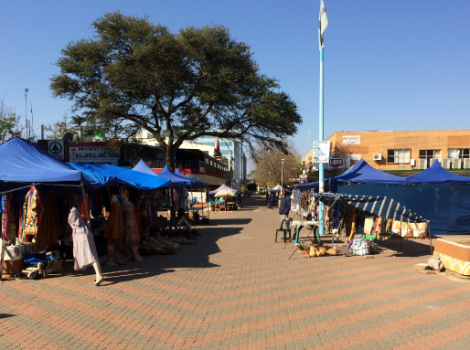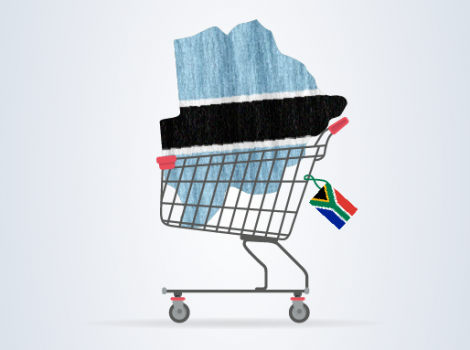
19 November 2024
Botswana recently witnessed a seismic shift in its political landscape as the ruling Botswana Democratic Party (BDP) lost power after 58 years, marking the first time in the nation’s history that an opposition party has taken control. This unprecedented, peaceful transition not only underscores Botswana’s commitment to democratic principles but also exemplifies the resilience of its political institutions—a rare feat that raises the bar for democratic governance across Africa.
The Umbrella for Democratic Change (UDC), led by Advocate Duma Boko, secured a clear majority with 36 seats in Parliament, leaving the BDP with a meager 4 seats. This election result was not a sudden change, but rather the culmination of a gradual decline in public support for the BDP over the years. The party’s struggles to address pressing social and economic challenges—particularly youth unemployment, economic stagnation, and inequality—have slowly eroded its standing among voters. Specific events over the past year, such as criticism over handling healthcare funding and increasing discontent with economic management, acted as catalysts that intensified public frustration, ultimately driving citizens to vote for change.
This election was more than a single defeat for the BDP; it symbolised a breaking point in the public’s patience with a party that had grown complacent and, at times, seemingly detached from the everyday struggles of the average Motswana.
Observers have noted that the BDP’s policies in recent years lacked the transformative impact required to address Botswana’s socio-economic challenges. Voters saw a party mired in old structures and a resistance to change, leading many to question whether the BDP could ever adapt to modern demands. The party’s leadership failed to respond adequately to mounting dissatisfaction, making it vulnerable to a well-organised opposition.
By contrast, the UDC proved highly effective in uniting diverse voter groups under a cohesive platform focused on change and reform. By addressing critical issues like employment and social equity, the UDC resonated with a public that was increasingly disillusioned with the status quo. The opposition’s ability to consolidate its message, capitalise on public grievances, and present itself as a credible alternative to the BDP demonstrated a high level of strategic insight that had been absent in previous elections.
Unlike past election cycles, this year’s campaign saw a focused and unified opposition, signaling a maturation in Botswana’s political ecosystem that reflects a broader trend on the continent: the rise of opposition movements that challenge long-entrenched powers by mobilising and galvanising popular sentiment for change.
President Mokgweetsi Masisi’s concession without protest is a significant moment in African politics, where transitions of power can often be tumultuous. His decision to step down graciously speaks volumes about his respect for democratic processes and reinforces Botswana’s reputation as a leader in peaceful governance. His acceptance of the electoral outcome and commitment to a smooth handover stand as a reminder that genuine leadership is shown not just in victory but in accepting defeat.
This outcome also raises important questions about the future of long-standing political parties in Africa. Botswana’s election mirrors a growing trend across the continent, where dominant parties that once held near-universal support are increasingly finding themselves challenged by a politically aware and dynamic electorate.
The BDP’s defeat represents a critical lesson for ruling parties across Africa: complacency and stagnation in leadership can be costly, especially in a rapidly changing political and socio-economic landscape.
Botswana’s Independent Electoral Commission (IEC) and civil society groups played vital roles in ensuring the credibility and transparency of the electoral process. The IEC’s professionalism bolstered trust in the results, while the media and civil society kept citizens informed, creating an environment where voters could make decisions based on facts rather than rhetoric. This level of civic engagement from various institutions illustrates the strength of Botswana’s democracy and underscores the importance of these groups in maintaining public confidence. The role of civil society and media in elections is something that many other African nations could seek to emulate, as it provides a foundation for accountability and informed choice.
The UDC now faces the substantial challenge of delivering on its campaign promises. Expectations are high, and the new government will need to address long standing issues, such as job creation, reducing income inequality, and reinvigorating the economy. Reversing decades of systemic problems won’t be an easy task, particularly in a nation accustomed to one-party dominance. However, by bringing a fresh perspective, the UDC has an opportunity to demonstrate how a responsive and reform-minded government can address the challenges facing Botswana’s youth and underserved communities.
For the BDP, this transition offers a crucial chance for reflection and renewal. Now in opposition, the party can refocus on its values and consider how best to serve Botswana’s citizens by adopting a more constructive role in holding the government accountable. This could strengthen Botswana’s political landscape by fostering a competitive, multiparty democracy that allows for a diversity of voices and perspectives. In doing so, the BDP may begin the process of regaining the public’s trust, potentially setting a foundation for future electoral success through a reinvigorated commitment to the people.
Botswana’s peaceful transfer of power represents a remarkable achievement for African democracy. By respecting the will of the people, President Masisi and the IEC have shown that Africa has the capability to lead by example in democratic governance.
This transition sends a powerful message that democracy, when rooted in strong institutions and civic responsibility, can withstand even the most significant shifts in power.
As Botswana embarks on this new chapter, the nation’s commitment to democratic values and institutional resilience stands as a beacon of hope, not only for its own people but also for Africa as a whole. This peaceful shift in power signals that Africa’s political future may be increasingly defined by transparency, accountability, and leaders who place national unity above personal ambition.
Source: https://democracyinafrica.org/botswanas-peaceful-power-shift-is-the-era-of-one-party-dominance-over/
About the author: Kevin D. Mofokeng is a writer and civic leader dedicated to using impactful storytelling to amplify African voices and advocate for social justice and development.



